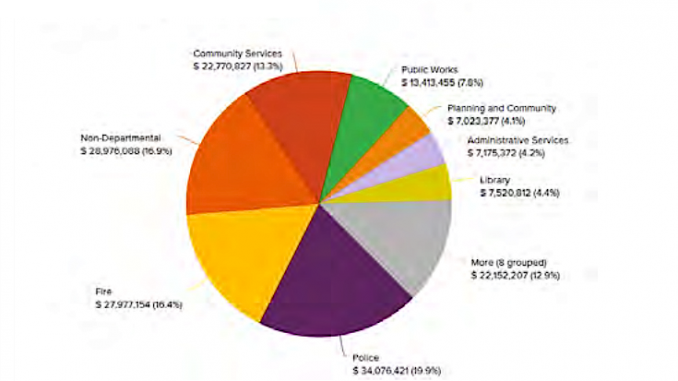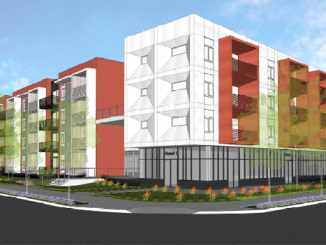
BY SARA TABIN
Daily Post Staff Writer
Councilman Greg Tanaka said at Palo Alto’s council meeting yesterday (May 12) that the city would solve a lot of its budget problems if every employee took a 17% pay cut. He said at the very least city administration should take voluntary salary cuts.
His comments were met with awkward silence.
The average city employee costs $231,968 a year including fringe benefits, according to city budget documents.
Instead of cutting pay, members of the police, fire and SEIU unions are scheduled to get raises ranging from 2% to 3% on July 1 as part of contracts that were negotiated last year. The raises will add $5.8 million to the city’s budget.
Tanaka’s pay cut proposal came as the council met for 10 hours yesterday to discuss how it would cut $39 million from its proposed budget for the fiscal year starting July 1. No final decisions were made, and everyone was unhappy.
Proposed cuts to fire and police
Councilwomen Alison Cormack, Liz Kniss and Lydia Kou all said they are concerned about proposed cuts to police and firefighters.
City Manager Ed Shikada snapped at Councilman Tom Dubois when he attempted to re-work the proposed capital improvements budget to free up some money during the financial crisis.
Mayor Adrian Fine told Tanaka to quote the Post less and stick to the budget when Tanaka said PR positions in the city should be cut. The city has four communications officers who cost taxpayers a combined $900,000 including benefits.
The council went through a budget proposed by Shikada that was broken down by cuts for different parts of the city like public safety and capital improvements.
Multiple items were put into “parking,” which means Shikada will bring them back to council with more information later this week.
Dispute over discretionary spending fund
Council spent the first hour of the meeting deciding whether to cut discretionary spending funding, or money not assigned to a specific purpose, allotted to the city manager and the council. Shikada said the money is used for small expenses like employee appreciation and funding Ada’s Cafe. He said those things would likely be cut if they all had to come individually to council.
Tanaka said he didn’t think the city needs $345,000 worth of “slush funds.”
Mayor Adrian Fine snapped at Tanaka for not using proper decorum with the slush fund remark.
Cormack said she thought Shikada should be able to keep his cash. The council ultimately agreed to let Shikada keep $200,000 but cut $145,000 from the contingency fund.
During the capital improvements discussion, Public Works Director Brad Eggleston defended the city’s decision to continue its $20 million bike bridge. He said the city has already put $5 million into the project and almost $11 million of it is covered by external grants including one from the county.
Shikada’s budget includes funding for a renovation of Fire Station 4 at 3600 Middlefield Road and the proposed new police station at 250 Sherman Ave. in the California Avenue District.
Tanaka said he wants to defer capital projects such as the police station and fire station so that there’s sufficient money for city services.
Fire Chief Geo Blackshire said there isn’t enough space to store equipment at Fire Station 4 and it isn’t seismically fitted, but said the firefighters will make do with whatever council decides.
During the capital projects discussion, council’s metaphors got creative.
Councilman Eric Filseth said you shouldn’t buy a new sports car if you have been laid off. Cormack said if your fridge is broken you still have to buy a new one.
Cutting capital projects
Councilman Tom DuBois attempted a motion to defer $20 million in projects, including both the fire and police buildings, which would save $11.7 million. He said he wanted to add $5 million in other projects including $2 million in renovations on the Roth Building and $1 million for Baylands flood levees.
Shikada said deferral means cancellation of those project if the funds for the projects are used elsewhere.
“We have to cut $39 million in the next 30 days,” Shikada said. “We are not going to be able to do that if you give us this assignment.”
DuBois agreed to withdraw the motion but said he wants Shikada to realize that projects recommended by the Infrastructure Blue Ribbon Commission are not sacrosanct. The 17-member commission met in 2010 and 2011 to come up with a list of infrastructure projects the city needed to complete.
DuBois said he was surprised more capital project cuts weren’t proposed.
Cuts to police and fire services also proved difficult for council.
Police Chief Robert Jonsen said cuts will impact the ability for police to keep their front desk open at 275 Forest Ave., thoroughly investigate crimes and respond to California Public Record Act requests.
Jonsen and Blackshire both said they want to reduce staffing through attrition and try to hold on to younger employees.
Blackshire said Palo Alto’s ambulance service is important because it responds to emergencies twice as fast as the county ambulance.
Councilwoman Liz Kniss said in ancient times cities were formed for protection against marauders. She said she wants the departments to save their new hires. She said she is troubled by cutting two essential services, fire and police.
The council agreed to put staffing and emergency responses into the “parking lot” to revisit.
Tanaka said public safety workers make more than most workers in Palo Alto. He said most people including Stanford hospital workers are taking pay cuts. He suggested that administration members take voluntary pay cuts as a show of shared sacrifice.
Jonsen, Blackshire, Shikada and Emergency Operations Center Leader Ken Dueker did not immediately offer to have their salaries cut.
Police spokeswoman’s job cut
Tanaka also said he wants police spokeswoman Janine De la Vega to be cut since boots on the ground are a better use of money than PR.
Shikada said her position will be cut in the budget proposal.
Kniss said she thinks fire and police personnel have more merit than a new fire station. Cormack asked whether council could come back to public safety if they found cuts to make elsewhere.
“We agreed to make some serious cuts to our budget,” said Fine. “We are two items in and it seems like we don’t want to do this.”
Council will resume its budget discussions today at 1 p.m. in a meeting held on the Zoom platform. For instructions on how to participate, go to the council agenda.




$231,968 per employee and council isn’t willing to cut their pay? While others in our community have lost their jobs and are lining up at food banks? I’m embarrassed to be a Palo Altan.
Cut labor costs now.
Let’s cut his first. Most of us are in the hole with bills. How the hell are we supposed to catch up if you lower our salary’s. Bad idea. How about all these CEOs take a big pay cut. Instead of all the small people like farm workers. Who ever said this is a idiot.
A fair pay cut proposal would be progressive 0% of earnings up to $50K; 5% of earnings 50K-$100k; 10% of earnings $100K to 200K; 20% of earnings 200K to $300K; and 50% of earnings above $300K with no step ups for 2020-2022. This could work for the city, schools admin, staff, and teachers and all local government employees. Newsom is recommending 10% across the Board. That hurts earners under $50K and under $100K.
Tanaka is a pretty good PR machine for himself, perhaps we should eliminate his council position? Since he clearly thinks that “PR” is the only thing communication professionals do for city departments. Fair’s fair.
Tell the council what you really think by taking Lydia Kuo’s detailed and comprehensive survey http://www.Lydiakou.com
EMAIL SENT TO PA CITY COUNCIL
Dear Palo Alto City Council,
I am a resident of midtown Palo Alto and I agree with councilman Tanaka’s proposal.
Palo Alto at times claims to be the heart of Silicon Valley, and salary cuts are often a tactic used to keep tech companies and startups afloat during tough times. It also benefits employees overall as no one loses their jobs.
I’m stunned at the numbers reported in this article particularly:
“The average city employee costs $231,968 a year including fringe benefits, according to city budget documents.”
In addition, the shockingly high salary paid to the city manager (and the previous one and other top administrators) are already unsustainable in light of this financial crisis brought on by the Corona virus. I just don’t understand how the council cannot consider modest salary reductions for the higher paid employees who also get extremely generous pensions and health care.
Wile I did not watch the council meeting I was equally stunned by the way Tanaka’s proposal was received, according to this article.
I respectively request this issue be brought to the residents of Palo Alto so that they can provide their opinions and fully understand the position of each councilmember so as to help guide us on election day.
Thank you.
Midtown Resident
Palo Alto
https://padailypost.com/2020/05/13/councilmans-proposal-to-cut-salaries-to-balance-the-budget-goes-nowhere/
I realize that cutting pay won’t be easy with the unions, and what the city will probably have to do is wait for the contracts to expire and then cut their wages. This council is too chicken to do that, though, so this extravagance will continue. Hopefully residents will elect new council members this November who will be more frugal with taxpayer money. Fine, Tanaka and Kou are facing re-election while Kniss’ seat will be open because she can’t run again. So if you want to cut the budget, get ready to run for council now. (I would run but I’m older than Joe Biden).